Opinion poll indicates NI voters would reject Irish unity
- Published
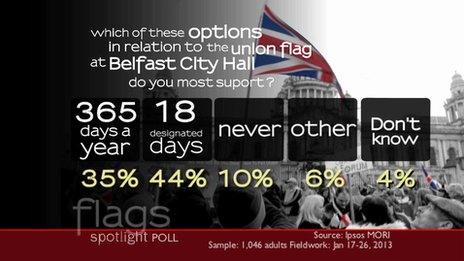
The Spotlight poll suggests raising the flag on 18 designated days is the most popular compromise across the community as a whole. 44% of those interviewed backed the designated days policy, in comparison to 35% wanting the Union flag raised throughout the year
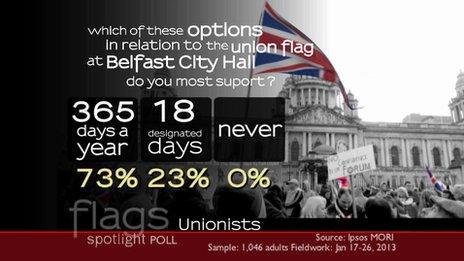
Although designated days was the most popular option, flag flying polarises unionists and nationalists. 73% of unionists want the Union flag up at Belfast City Hall 365 days a year
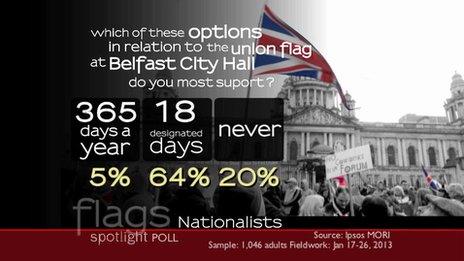
64% of nationalists support the 18 day policy
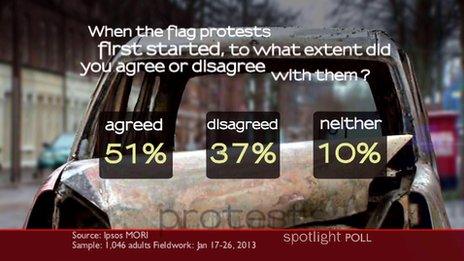
Just over half of those interviewed thought the union flag protestors were right to take to the streets when Belfast City Council made its decision in early December
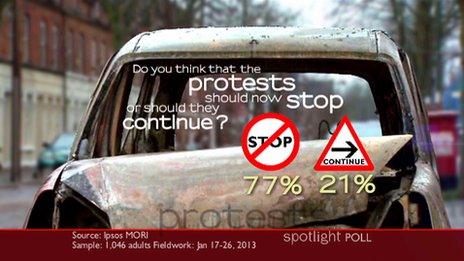
This support appears to have now dwindled as more than three quarters of interviewees want the protests to stop
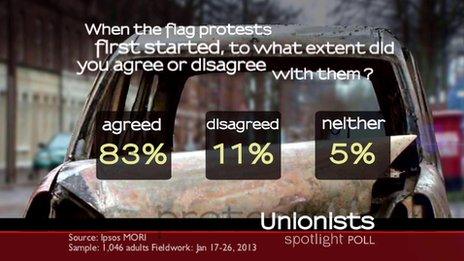
83% of unionists said they agreed with the flag protests when they began
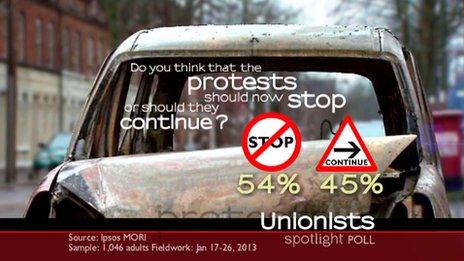
45% of unionists still believe the demonstrations should continue
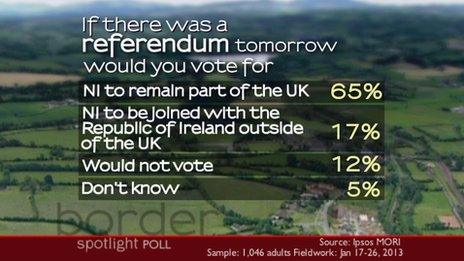
65% of the interviewees want Northern Ireland to remain part of the UK
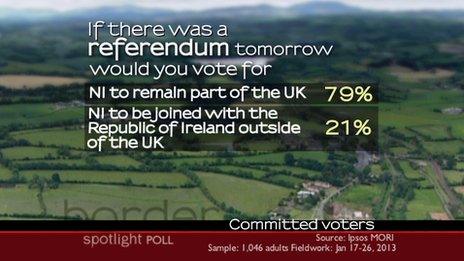
That figure jumps to 79% when only committed voters are taken into consideration
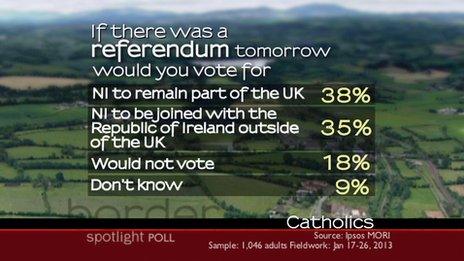
38% of Catholics also favoured remaining within the UK - three percentage points more than the number who backed a United Ireland
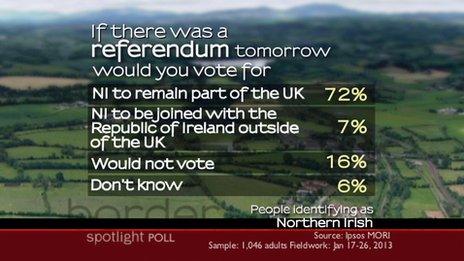
People who identified themselves as "Northern Irish" for the BBC Spotlight poll back staying in the UK by a significant margin - 72% to just 7%
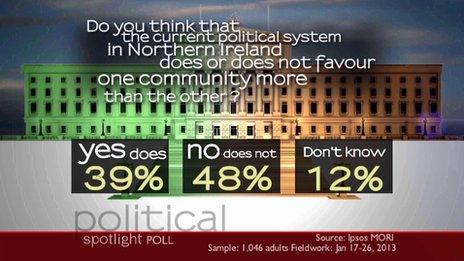
A majority of interviewees did not believe the current Stormont system was biased towards one community
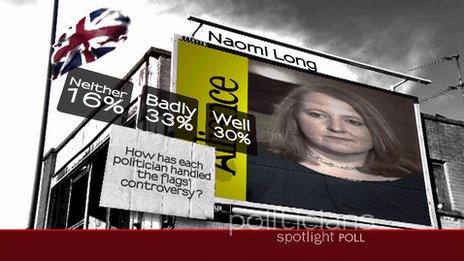
The poll also asked interviewees to rate how specific politicians have dealt with the flag protests
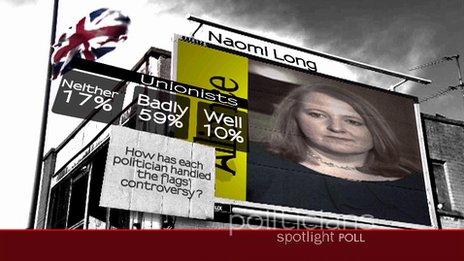
Alliance's support for a "designated days" flag flying policy at Belfast City Hall stirred controversy and led to attacks on the party's offices and a death threat against its only MP, Naomi Long
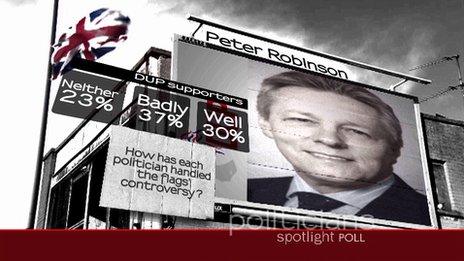
The poll was carried out for the BBC Spotlight programme by Ipsos Mori, whose researchers interviewed more than 1,000 adults at 64 locations across Northern Ireland between 17 and 26 January
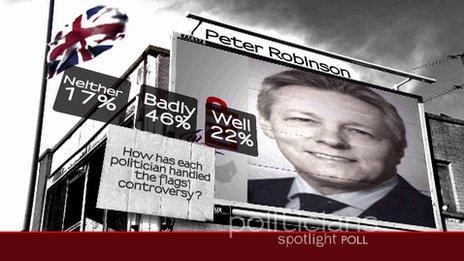
Spotlight is publishing the full details online at http://downloads.bbc.co.uk/tv/spotlight/survey.pdf
A BBC Spotlight poll strongly indicates voters in Northern Ireland would reject a united Ireland in a border poll.
Even with the usual caveats attached to opinion polls, a 65% to 17% majority for Northern Ireland remaining in the UK suggests little room for doubt.
The British and Irish governments have both made it clear they don't think now is the time to hold a border poll.
Sinn Fein are campaigning for a poll and the DUP have discussed, in their words, calling Sinn Fein's bluff.
But after weeks of controversy about flags and national identity, politicians' claims about Catholic unionism, and a census showing a growing number identifying themselves as Northern Irish, what lies behind that headline figure in the Spotlight opinion poll is particularly revealing.
Undecided
Not surprisingly, more than 90% of those who identify themselves as Protestants told the pollsters they wanted to stay in the UK.
But on the other side of the religious divide, a substantial 38% of Catholics also favoured remaining within the UK - three percentage points more than the number who backed a united Ireland.
While only 5% of Protestants don't intend to vote or haven't decided which option they would pick, more than a quarter of Catholics are either undecided or not planning on voting.
As avowed believers in a united Ireland and the party running a border poll campaign, Sinn Fein might be surprised to learn that nearly a quarter of those who identified themselves as Sinn Fein voters - 23% - told the pollsters they would back the status quo in a border poll.
More than half of SDLP supporters - 56% - also said they would opt to stay in the UK if a poll was held tomorrow.
Prime Minister David Cameron said the survey for the BBC Spotlight programme on the potential outcome of a border poll should lift the spirits of all those who value Northern Ireland's place within the union.
The results of the 2011 census, released in December last year, revealed that just over a fifth of the population considers itself "Northern Irish".
That posed a political puzzle - in a border poll would these people tick a British or an Irish box? Well, those who identified themselves as "Northern Irish" for the BBC Spotlight poll back staying in the UK by a significant margin - 72% to just 7%.
Controversy
At the DUP conference late last year Peter Robinson hinted that his party hopes to make inroads into Catholic unionist territory. Since then commentators have expressed the view that the union flag dispute and the ensuing protests make this a pipe dream.
The Spotlight survey suggests the main parties have a long way to go to reach across the religious divide. Those identifying themselves as DUP supporters are 97% Protestant, while UUP supporters are 99% Protestant.
Those backing Sinn Fein are 99% Catholic, while SDLP supporters are 92% Catholic. Alliance, as an identifiably centre ground party, is the one bucking the trend - with 51% Protestant backing and 36% Catholic support.
Alliance's support for a "designated days" flag flying policy at Belfast City Hall stirred controversy and led to attacks on the party's offices and a death threat against its only MP, Naomi Long.
However the Spotlight poll suggests raising the flag on 18 designated days is the most popular compromise across the community as a whole.
Of those interviewed, 44% backed the designated days policy, in comparison to 35% wanting the union flag raised throughout the year.
A further 10% told the pollsters no flag should be flown at the City Hall, while only 2% opted for the union flag flying alongside the Irish tricolour.
Although designated days was the most popular option, flag flying polarises unionists and nationalists. 73% of unionists want the union flag up at Belfast City Hall 365 days a year, while 64% of nationalists support the 18 day policy.
Disruptive
Even though the designated days compromise got more support than any other option, just over half of those interviewed thought the union flag protestors were right to take to the streets when Belfast City Council made its decision in early December.
This result may reflect some people's belief in the right to protest, even if they don't back the aim of a particular demonstration.
However this support appears to have dwindled sharply during the course of January, as by the time the Spotlight survey was carried out more than three quarters of interviewees wanted the protests to stop.
They told the pollsters this was for a variety of reasons, the main ones being the violence sparked by some protests and the disruptive impact on business.
Although the Stormont politicians might take heart from this shift of opinion, the protest organisers will point to the fact that by late January 45% of unionists still believed the demonstrations should continue. This shows a degree of resilience given the barrage of negative publicity generated by the protests.
The poll was carried out for the BBC Spotlight programme by Ipsos Mori, whose researchers interviewed more than 1000 adults at 64 locations across Northern Ireland between 17 and 26 January.
The full details are available as a pdf, external, 897kb in size.
They include findings on how people rated individual politicians' handling of the flags crisis, which parties those interviewed support and whether those surveyed believe the Stormont system favours one community over another.
- Published5 February 2013
- Published23 January 2013
- Published22 January 2013
- Published23 January 2013
- Published22 January 2013
- Published12 December 2012
- Published29 November 2012
- Published24 November 2012